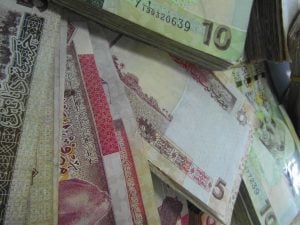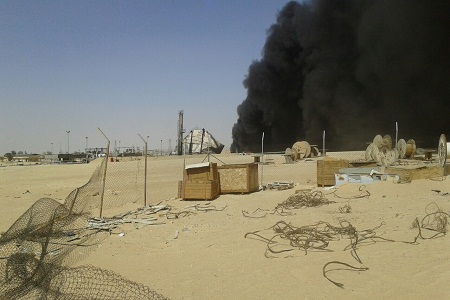By Sami Zaptia.

London, 22 February 2016:
The Tripoli-based Administrative Control Authority (ACA) has announced that it has carried out ‘‘an investigation’’ into . . .[restrict]‘’the causes of the shortage of certain banknotes’’ at Libyan banks and that remedies have been ‘’put in place to solve the problem’’.
The Libyan ACA is the body concerned with the oversight of administrative and state employee corruption or maladministration. Its sister body the Audit Bureau is concerned with the oversight of financial matters.
The ACA said that its investigations have revealed that the banknote shortage was as a result of ‘‘the decline in the flow of revenues to banks’’.
‘‘Work is underway’’, the ACA explained ‘‘to solve the cause of the shortage through relevant sectors’’ and that the first shipment of LD 10 bn of LD 10 and LD 5 banknotes have already been received.
It will be recalled that there has been a major cash crisis in Libya as banks have, intermittently, suffered a shortage of banknotes. This has led to long queues and angry scenes at banks, as frustrated customers have vented their anger at their inability to withdraw their money.
In November last year, a woman shot up her local Wahda bank branch in Zawia after it was unable, due to a banknote shortage, to give her any money. Earlier this month a Tripoli bank was so short of banknotes that it was forced to pay-off pensioners in sacksful of coins.
Banks have also been forced to impose on and off withdrawal limits on customers in an effort to please the maximum number of customers using their finite cash supplies. In December Jumhouria bank announced that, in an effort to alleviate the cash crises, it was introducing internet banking.
The shortage of banknotes is a symptom and reflection of the political, financial and security situation in Libya. There is no doubt that the crash in Libya’s oil revenues through a fall in its oil production as well as the slump in international crude oil prices have contributed greatly to the decline in economic activity in the country.
However, the feeling of insecurity and lack of trust in the security, financial and political situation in the country has meant that many Libyans feel safer hoarding their money at home rather than taking the risk by depositing money into their bank accounts.
The outbreak of bank heists by militias as well as the spate of kidnappings have also compounded the banknote shortage problem. It was widely believed that some militias were cooperating with or coercing bank employees into gaining knowledge of bank balances of kidnap victims. [/restrict]








